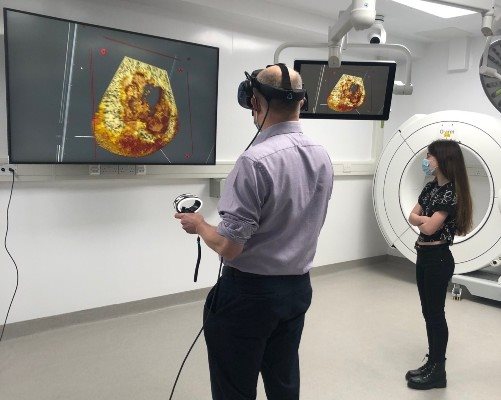New virtual reality technology to improve heart surgery
Posted on Wednesday 16th February 2022

Professor John Simpson using virtual reality with patient, Rosie, to view her heart.
New technology developed by researchers at Evelina London and King’s College London allows surgeons to immerse themselves into a patient’s heart to plan surgery using virtual reality.
Thanks to funding from Evelina London Children’s Charity and British Heart Foundation (BHF), virtual reality technology can now bring together scans to create a three-dimensional, digital image of the heart.
This new technology could shorten operating times and reduce the need for multiple surgeries, leading to better outcomes and experiences for patients and their families.
Surgeons found when using early forms of the software it helped to increase their understanding of the structure of their patient’s heart, as they could immerse themselves in the image. It also allows them to interact with and manipulate the images, and trial options in virtual reality before the operation.
Lead researcher, Professor John Simpson, consultant paediatric and fetal cardiologist at Evelina London and King’s College London, said: “Procedures to repair the heart’s anatomy can be complex, and surgeons don’t like surprises. Each patient’s condition has individual characteristics to their heart. Our technology will allow surgeons to plan and practice these procedures, and we’re currently applying for approval for it to be used in this way.
“We think that this technology could also be used outside of congenital heart disease surgeries, to plan any procedure which aims to repair a structural problem within the heart, such as valve surgery in an adult patient.”
Parents, Darren and Gemma Nesbitt, knew daughter, Rosie, had a heart condition before she was born after it was identified on an ultrasound scan. She was just ten days old when she had major surgery at Evelina London to repair problems with some of her heart’s major blood vessels.
Mum, Gemma, said: “You’re given so many different pieces of information when your child is diagnosed with a heart condition, but I really struggled to understand what the problems in Rosie’s heart meant for her. Being able to see her heart using this technology would have been a huge help for me to understand more about her complex heart structure.”
Rosie, now 10, had a further procedure at the age of nine to repair a valve in her heart and close a hole in the wall between her ventricles, the large muscular chambers that pump blood out of the heart.
Dad, Darren, added: “Anything that can give surgeons more information going into an operation, or that could shorten the time spent operating, would be a major help. This technology could bring real comfort and reassurance to families like ours. Rosie is already a big fan of virtual reality and she thinks it would be so cool to see her own heart!”
Find out more about Evelina London's heart services.